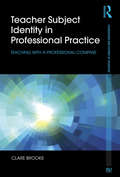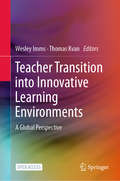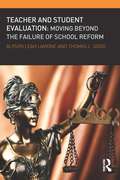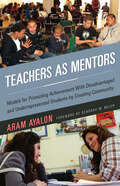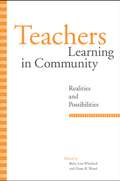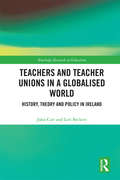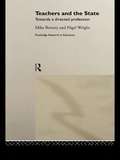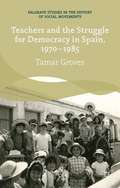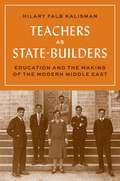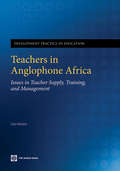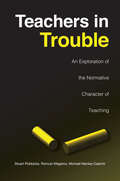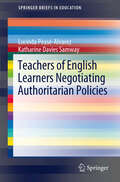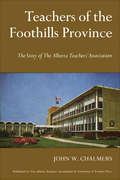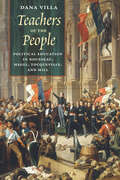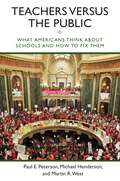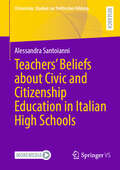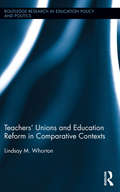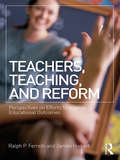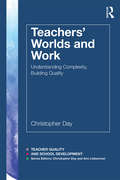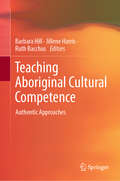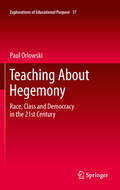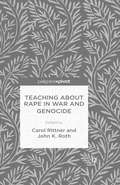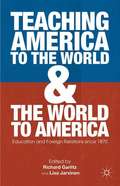- Table View
- List View
Teacher Subject Identity in Professional Practice: Teaching with a professional compass (Foundations and Futures of Education)
by Clare BrooksTeacher Subject Identity in Professional Practice focuses on a key, but neglected, element of a teacher’s identity: that of their subject expertise. Studies of teachers’ professional practice have shown the importance of a teacher’s identity and the extent to which it can affect their resilience, commitment and ultimately their effectiveness. Drawing upon narrative research undertaken with a range of teachers over a period of 14 years, the book explores how subject expertise can play a significant role in teacher identity, acting as a professional compass guiding teachers at all levels of their professional practice. It reveals powerful individual stories of meaning-making which highlight the dynamic importance of teachers’ subject expertise The book’s metaphor of a professional compass goes to the heart of teacher professionalism, and provides a valuable mechanism to enable teachers to respond to challenges they face in their daily practice. It enables teachers to consider the moral dimensions of their practice, and can constitute a significant component in professional formation and identity. Throughout the book the importance of subject expertise for teachers’ professional practice is explored at a range of scales: from the classroom to broad education policy, and at different stages of a teacher’s career which offers readers a deeper understanding of the importance of subject expertise for teachers. Teacher Subject Identity in Professional Practice makes a significant contribution to an under-researched area. It identifies the role and significance of teachers’ subject expertise as a dimension of their teacher identity. The book is key reading for teacher educators, policy makers and researchers with an interest in teachers’ professional development and practice.
Teacher Transition into Innovative Learning Environments: A Global Perspective
by Thomas Kvan Wesley ImmsThis open access book focuses on how the design and use of innovative learning environments can evolve as teaching practices and education policies change. It addresses how these new environments are used, how teachers are adapting their practices, the challenges that these changes pose, and the effective evaluation of these changes. The book reports on emerging research in learning environments, with a particular emphasis on how teachers are transitioning from traditional classrooms to innovative learning environments. It offers a significant evidence-based global assessment of current research in this field by designers, architects, educators and policy makers. It presents twenty-five cutting-edge projects from researchers in fifteen countries. Thanks to the book’s comprehensive international perspective, which combines theory and practice in a single publication, readers will gain a wealth of new insights.
Teacher and Student Evaluation: Moving Beyond the Failure of School Reform
by Thomas L. Good Alyson Leah LavigneFollowing the recent major school reform of Race to the Top, schools, teachers, and students are increasingly evaluated through high-stakes achievement test scores. In six concise chapters, Teacher and Student Evaluation explores the historical rise and modern landscape of accountability in American education, and the current models of teacher evaluation. The authors provide realistic and useful suggestions for responding to current accountability demands. The authors explore the methodological concerns and policy implications of using value-added and observational measures to make high-stakes decisions. After reaching the conclusion that these contemporary evaluation practices are flawed, Alyson Lavigne and Thomas Good offer possible solutions that inform current and future teacher evaluation. This book is a valuable resource for students of educational assessment as well as policy makers, administrators, and teachers who are currently building accountability plans. The book is written in an accessible but authoritative fashion that practitioners, policymakers, and scholars will find useful.
Teachers As Mentors: Models for Promoting Achievement with Disadvantaged and Underrepresented Students by Creating Community
by Aram AyalonThe book describes two similar and successful models of youth mentoring used by two acclaimed urban high schools that have consistently achieved exceptional graduation rates. Providing a detailed description of their methods – based upon extensive observation, and interviews with teachers, students, administrators, and parents – this book makes a major contribution to the debate on how to reduce the achievement gap.Using similar teacher-as-youth mentor and youth advising models, these two inner city schools – Fenway High School in Boston, Massachusetts; and the Kedma School in Jerusalem – have broken the cycle of failure for the student populations they serve—children from underrepresented groups living in poverty in troubled neighborhoods with few resources. Students in both schools have excelled academically, rarely dropout, and progress to college in significant numbers (Fenway has 90% graduation rate, with 95% of graduates going on to college. Kedma outperforms comparable urban schools by a factor of four). Both schools have won numerous awards, with Fenway High School gaining Pilot School status in Massachusetts, a recognition the state only awards to a few exemplary schools; and Kedma School being declared one of the 50 most influential educational endeavors in Israel.The success of both schools is directly attributable to their highly developed teacher-as-a-youth mentor programs that embody an ideology and mission that put students at the center of their programs and structures. The models are closely integrated with the curriculum, and support the social, emotional, cultural, and academic needs of students, as well as develop close mentor-student-parent relationships. The model furthermore includes extensive support for the mentors themselves. Apart from the potential of these models to narrow the achievement gap, these two schools have a record of creating a school climate that promotes safety, and reduces the incidence of bullying and violence. At the heart of both programs is creating community—between departments and functions in the school; and between teachers, staff, students, and parents. Everyone in the school system should read this book.Research suggests that caring relationships between students and teachers significantly enhance Social Emotional Learning (SEL) -- defined as the process through which children develop their ability to integrate thinking, feeling, and behaving to achieve important life tasks -- which is recognized as an important factor in children's success in school. However, caring schools are usually the exception, especially at the secondary level where relationships between students and teachers seem to deteriorate significantly. This book provides a schoolwide model for establishing caring secondary schools and enhancing SEL using a teacher-as-a youth mentor model.
Teachers Learning in Community: Realities and Possibilities (SUNY series, Restructuring and School Change)
by Diane R. Wood Betty Lou WhitfordThis book raises provocative questions about the efficacy, viability, and sustainability of professional learning communities given the present political and structural realities of public schools. The culmination of six years of research in five states, it explores real world efforts to establish learning communities as a strategy for professional development and school improvement. The contributors look at the realities of these communities in public schools, revealing power struggles, logistical dilemmas, cultural conflicts, and communication problems—all forces that threaten to dismantle the effectiveness of learning communities. And yet, through robust and powerful descriptions of particularly effective learning communities, the authors hold out promise that they might indeed make a difference. Anyone persuaded that learning communities are the new "magic bullet" to fix schools needs to read this book, including teacher educators, educational leaders and practitioners, professional developers, and educational leadership faculty.
Teachers and Academic Partners in Urban Schools: Threats to professional practice (Teacher Quality and School Development)
by Lori Beckett'Showing how critical thinking and local democracy can be a spur to very real educational development within schools that are facing severe challenges, this book provides us with one very valuable contemporary resource of hope.' Ian Menter, Professor of Teacher Education, University of Oxford, UK Teachers and Academic Partners in Urban Schools identifies and addresses a major problem for practitioners – teachers, student teachers and teacher educators – working in urban schools burdened by highly restrictive teaching methods and pressures to meet unrealistic benchmarks set by government. In this book, Lori Beckett investigates how to negotiate these tensions and challenges and offers an account of how to elevate practitioners’ professional voice on quality teaching along more democratic lines. The book addresses key issues for teachers in urban schools, such as: fractures in teachers’ professional communities; impacts of imposed marketizing policies and forced performative practices on schools; the complexities of teaching and teachers’ concerns about practice, as well as teaching practitioners’ perception of educational/schools policy. Both academic and teacher partners contribute to the work, showcasing the ways they have engaged with each other in joint work and with local government. Through this, the book supports a professional and politicized dialogue about teaching and teacher education, offering a meaningful account of how to fashion a form of educative schooling for students and families with complex needs. Written by a dynamic and experienced author, this book brings Beckett’s experience to bear on a controversial and complex area – addressing the general trend towards increased regulatory policy in education. It is an essential read for anyone interested in a rich analysis of how practitioners can work to reassert their professional voice and regain control of schools and teacher education, and will also appeal to those interested in the larger project of restoring school democracy.
Teachers and Teacher Unions in a Globalised World: History, theory and policy in Ireland (Routledge Research in Education)
by Lori Beckett John CarrTeachers and Teacher Unions in a Globalised World asks a series of pressing questions of teacher educators, teachers and teacher unions worldwide in this era of global capitalism. As governments around the world support austerity politics in the face of financial meltdowns, social inequalities, terrorist threats, climate catastrophe, wars and mass migrations, the book questions whether practitioners in teaching and teacher education are succumbing to pressures to dismantle their nation-state systems of education. The authors present a clearly argued case in Ireland for teachers and teacher educators organising to realise their moral and social responsibilities of free and fair schooling for all when it is most needed, as well as insisting on policy debates about a free publicly funded school system. At a time when teachers are feeling overwhelmed with workload and frustrated by the visible turning of events away from the historical record, the book emphasises the importance of practitioner research in informing decisions about a strategic and democratic way forward for education around the globe. Teachers and Teacher Unions in a Globalised World will be of great interest to academics and researchers in the field of education, as well as teacher educators, practitioners and policymakers.
Teachers and the State: Towards a Directed Profession (Routledge Research in Education #Vol. 3)
by Mike Bottery Nigel WrightThis book examines the status of training and continuing professional development of teachers on a national and international level. The authors argue that teachers need to feel that they are part of an empowering professionalism, in which their work has an effect on the abilities of students, and where they play a valuable role in shaping the direction of future society.
Teachers and the Struggle for Democracy in Spain, 1970–1985
by Tamar GrovesThis book analyses teachers' social movements during the Spanish transition to democracy, between 1970 and 1985. It shows how ordinary teachers struggled to liberate their country's education system from the legacy of dictatorship. It explores their organizations, the paths of action they chose and their interaction with the disintegrating autocracy and the emerging democracy. In addition to analyzing the national aspects of their initiatives it follows their grass-roots activities in two local contexts, the fast growing metropolitan city of Madrid and the backward rural province of Salamanca. It thus combines a general evaluation of the phenomenon with intimate glances at the people who drove it forward. The success of the transition, the book argues, was due not only to the manoeuvrings of political leaders, nor to poplar protests in the streets, but was instead a common civic effort. By vindicating the importance of democratic professionals it thus illuminates the Spanish transition to democracy from a new angle.
Teachers as State-Builders: Education and the Making of the Modern Middle East
by Hilary Falb KalismanThe little-known history of public school teachers across the Arab world—and how they wielded an unlikely influence over the modern Middle EastToday, it is hard to imagine a time and place when public school teachers were considered among the elite strata of society. But in the lands controlled by the Ottomans, and then by the British in the early and mid-twentieth century, teachers were key players in government and leading formulators of ideologies. Drawing on archival research and oral histories, Teachers as State-Builders brings to light educators’ outsized role in shaping the politics of the modern Middle East.Hilary Falb Kalisman tells the story of the few young Arab men—and fewer young Arab women—who were lucky enough to teach public school in the territories that became Iraq, Jordan, and Palestine/Israel. Crossing Ottoman provincial and, later, Mandate and national borders for work and study, these educators were advantageously positioned to assume mid- and even high-level administrative positions in multiple government bureaucracies. All told, over one-third of the prime ministers who served in Iraq from the 1950s through the 1960s, and in Jordan from the 1940s through the early 1970s, were former public school teachers—a trend that changed only when independence, occupation, and mass education degraded the status of teaching.The first history of education across Britain’s Middle Eastern Mandates, this transnational study reframes our understanding of the profession of teaching, the connections between public education and nationalism, and the fluid politics of the interwar Middle East.
Teachers in Anglophone Africa: Issues in Teacher Supply, Training, and Management
by Aidan G. MulkeenTeachers are at the heart of good education, and good teacher policies are essential to ensure adequate supply, deployment and management of teachers. Enrollment in primary education has grown rapidly in Sub-Saharan Africa. Yet teacher policy in the region has oft en evolved without clear planning; in the absence of an overall strategy, countries have experienced serious problems with teacher supply and deployment, as well as with the quality of teaching. Based on case studies of education systems and practices in eight English-speaking African countries, 'Teachers in Anglophone Africa: Issues in Teacher Supply, Training, and Management' closely examines issues of teacher supply, deployment, management and finance. The book suggests that these issues are closely interrelated. Low numbers of qualified teaching graduates may result in teacher shortages; these shortages may make it difficult to deploy teachers effectively. Problems with teacher deployment may result in inefficient utilization of the teachers available, and those teachers' effectiveness may be further reduced by weak teacher management and support systems. The book identifies policies and practices that are working on the ground, noting their potential pitfalls and pointing out that policies designed to address one problem may make another problem worse. 'Teachers in Anglophone Africa: Issues in Teacher Supply, Training, and Management' offers a useful synthesis of the issues and draws together a series of promising practices, which can serve as positive suggestions for countries seeking to improve their teacher policies. The book should be of great assistance to education ministries and their development partners throughout the region as they address the challenges of the next phases of expansion in education.
Teachers in Trouble: An Exploration of the Normative Character of Teaching
by Michael Manley-Casimir Romulo Magsino Stuart PiddockeThe teacher who has an affair with a student. The teacher who is a transvestite. The teacher who advocates personal beliefs. These are 'teachers in trouble.' Their behaviour, whether it occurs in the classroom or off the job, offends the community and brings down censure from the school board.At root, schools are cultural institutions and teaching, a cultural activity. Teachers are expected to shape students according to accepted community norms. They interpret and apply curricula - and can divert curricula from their intended purpose. Teachers are at the eye of the vortex in the struggle for control over education, buffeted by the forces of social change and conflicting public expectations. The authors of this book examine how teacher conduct is monitored and what types of misconduct can produce 'social dramas.' Boards of reference have been established to arbitrate disputes between school boards and teachers who are dismissed. Drawing on the decisions of these boards of reference across Canada, the authors identify normative issues and propose a classification scheme for contentious behaviours.Teachers in Trouble poses fundamental questions about the role of teachers in society. It is an invaluable guide for teachers and professional organizations, education administrators, and members of the community who are concerned about ethics in our schools.
Teachers of English Learners Negotiating Authoritarian Policies
by Lucinda Pease-Alvarez Katharine Davies SamwayIn an effort to reverse the purported crisis in U.S. public schools, the federal government, states, districts have mandated policies that favor standardized approaches to teaching and assessment. As a consequence, teachers have been relying on teacher-centered instructional approaches that do not take into consideration the needs, experiences, and interests of their students; this is particularly pronounced with English learners (ELs). The widespread implementation of these policies is particularly striking in California, where more than 25% of all public school students are ELs. This volume reports on three studies that explore how teachers of ELs in three school districts negotiated these policies. Drawing on sociocultural and poststructural perspectives on agency and power, the authors examine how contexts in which teachers of ELs lived and worked influenced the messages they constructed about these policies and mediated their decisions about policy implementation. The volume provides important insights into processes affecting the learning and teaching of ELs.
Teachers of the Foothill Province: The Story of The Alberta Teachers' Association
by John ChalmersIn 1967 the Alberta Teachers' Association published, in honour of Canada's Centennial, a history of the public school system in Alberta entitled Schools of the Foothills Province. This informative book published for the Association by University of Toronto Press is now followed by a companion volume written by the same author, which tells the story of the Association itself, and its long and sturdy efforts to improve the position of teachers and the quality of education in the province. After providing the background to the formation of the ATA (which officially began on July 24, 1918) the author goes on to describe the growth of the organization from its beginnings as a spare-time activity for teachers to a strong influential union. From its earliest years it was affiliated with the labour movements of the Twenties, and fought with increasing strength for the rights of Alberta teachers. Throughout this study, the ATA's concern is evident not only for the economic aspects of teaching for higher salaries and pension schemes, but also for other features: departmental examinations and curricula, preparation and certification of teachers, and educational research.The ATA's mercurial relations with the provincial government are related, its struggle through the depression years and its blossoming in the first decade after 1935 under a Social Credit Government. Leading personalities move through this story against the turbulent background of a growing young province, contributing an air of vigorous controversy and achievement to the story of the ATA.
Teachers of the People: Political Education in Rousseau, Hegel, Tocqueville, and Mill
by Dana Villa2016 witnessed an unprecedented shock to political elites in both Europe and America. Populism was on the march, fueled by a substantial ignorance of, or contempt for, the norms, practices, and institutions of liberal democracy. It is not surprising that observers on the left and right have called for renewed efforts at civic education. For liberal democracy to survive, they argue, a form of political education aimed at “the people” is clearly imperative. In Teachers of the People, Dana Villa takes us back to the moment in history when “the people” first appeared on the stage of modern European politics. That moment—the era just before and after the French Revolution—led many major thinkers to celebrate the dawning of a new epoch. Yet these same thinkers also worried intensely about the people’s seemingly evident lack of political knowledge, experience, and judgment. Focusing on Rousseau, Hegel, Tocqueville, and Mill, Villa shows how reformist and progressive sentiments were often undercut by skepticism concerning the political capacity of ordinary people. They therefore felt that “the people” needed to be restrained, educated, and guided—by laws and institutions and a skilled political elite. The result, Villa argues, was less the taming of democracy’s wilder impulses than a pervasive paternalism culminating in new forms of the tutorial state. Ironically, it is the reliance upon the distinction between “teachers” and “taught” in the work of these theorists which generates civic passivity and ignorance. And this, in turn, creates conditions favorable to the emergence of an undemocratic and illiberal populism.
Teachers versus the Public
by Paul E. Peterson Martin R. West Michael HendersonA comprehensive exploration of 21st Century school politics, Teachers versus the Public offers the first comparison of the education policy views of both teachers and the public as a whole, and reveals a deep, broad divide between the opinions held by citizens and those who teach in the public schools. Among the findings: Divisions between teachers and the public are wider and deeper than differences between other groups often thought to contest school policy, such as Republicans and Democrats, the young and the old, the rich and the poor, or African Americans and whites. The teacher-public gap is widest on such issues as merit pay, teacher tenure reform, impact of teacher unions, school vouchers, charter schools, and requirements to test students annually. Public support for school vouchers for all students, charter schools, and parent trigger laws increases sharply when people are informed of the national ranking of student performance in their local school district. Public willingness to give local schools high marks, its readiness to support higher spending levels, and its support for teacher unions all decline when the public learns the national ranking of their local schools. On most issues, teacher opinion does not change in response to new information nearly as much as it does for the public as a whole. In fact, the gap between what teachers and the public think about school reform grows even wider when both teachers and the public are given more information about current school performance, current expenditure levels, and current teacher pay.The book provides the first experimental study of public and teacher opinion. Using a recently developed research strategy, the authors ask differently worded questions about the same topic to randomly chosen segments of representative groups of citizens. This approach allows them to identify the impact on public opinion of new information on issues such as student performance and school expenditures in each respondent's community.The changes in public opinion when citizens receive information about school performance are largest in districts that perform below the national average. Altogether, the results indicate that support for many school reforms would increase if common core state standards were established and implemented in such a way as to inform the public about the quality of their local schools. These and many other findings illuminate the distance between teacher opinions and those of the public at large.About the Research: In partnership with the Harvard Program on Education Policy and Governance and the journal, Education Next, authors Paul E. Peterson, Martin West and Michael Henderson surveyed nationally representative samples of teachers and the public as a whole annually between 2007 and 2013.
Teachers versus the Public
by Paul E. Peterson Martin R. West Michael HendersonA comprehensive exploration of 21st Century school politics, Teachers versus the Public offers the first comparison of the education policy views of both teachers and the public as a whole, and reveals a deep, broad divide between the opinions held by citizens and those who teach in the public schools. Among the findings: Divisions between teachers and the public are wider and deeper than differences between other groups often thought to contest school policy, such as Republicans and Democrats, the young and the old, the rich and the poor, or African Americans and whites. The teacher-public gap is widest on such issues as merit pay, teacher tenure reform, impact of teacher unions, school vouchers, charter schools, and requirements to test students annually. Public support for school vouchers for all students, charter schools, and parent trigger laws increases sharply when people are informed of the national ranking of student performance in their local school district. Public willingness to give local schools high marks, its readiness to support higher spending levels, and its support for teacher unions all decline when the public learns the national ranking of their local schools. On most issues, teacher opinion does not change in response to new information nearly as much as it does for the public as a whole. In fact, the gap between what teachers and the public think about school reform grows even wider when both teachers and the public are given more information about current school performance, current expenditure levels, and current teacher pay.The book provides the first experimental study of public and teacher opinion. Using a recently developed research strategy, the authors ask differently worded questions about the same topic to randomly chosen segments of representative groups of citizens. This approach allows them to identify the impact on public opinion of new information on issues such as student performance and school expenditures in each respondent's community.The changes in public opinion when citizens receive information about school performance are largest in districts that perform below the national average. Altogether, the results indicate that support for many school reforms would increase if common core state standards were established and implemented in such a way as to inform the public about the quality of their local schools. These and many other findings illuminate the distance between teacher opinions and those of the public at large.About the Research: In partnership with the Harvard Program on Education Policy and Governance and the journal, Education Next, authors Paul E. Peterson, Martin West and Michael Henderson surveyed nationally representative samples of teachers and the public as a whole annually between 2007 and 2013.
Teachers' Beliefs about Civic and Citizenship Education in Italian High Schools (Citizenship. Studien zur Politischen Bildung)
by Alessandra SantoianniVarious social and political actors are responsible to educate citizens to sustain democracy. Civic and Citizenship Education (CCE) addresses this issue and has gained prominence. Italy made the subject compulsory in schools with the law n.92/2019. Different conceptualisations of CCE have the notion of citizenship at the centre, which can differentiate between traditional and critical approaches. Despite this, little is known about what teachers believe in terms of citizenship and what the subject should involve in terms of goals, content and methods. This work aims to understand Italian teachers' views on CCE and its implementation and contribute to its systematisation as a scientific discipline. The author interviewed Italian high school teachers and analysed the results. The results show that teachers’ beliefs about the goals of CCE relate to broad social and political issues and students’ learning. These beliefs also show civic republican values. Three macro-areas of content from the 92/2019 law serve as a framework for teachers to select topics they believe are relevant, and Lawfulness Education is the key to the content, goals and teaching strategies. Teachers are unclear whether CCE should be a separate, transversal or integrated subject. Ultimately, they implement what they believe in despite the policy changes introduced by the 92/2019 law.
Teachers' Unions and Education Reform in Comparative Contexts (Routledge Research in Education Policy and Politics)
by Lindsay WhortonTeachers’ unions have long been controversial and divisive organizations, but criticism and distrust of them may be at an all-time high. This volume considers the prevailing assumption that unions successfully block change in education because they are primarily motivated to protect members’ interests. It challenges the conceptualization of teacher union motivation and provides a more nuanced account of unions’ interests, power and impact. Through a series of international cases from the United States, Finland and the Canton of Zürich, this volume examines the hot-button issue of performance-related pay reform and compensation. It argues that a better understanding of the union-management relationship may be the key to securing more meaningful change and reform. It will be of use to scholars, policy-makers, union leaders, teachers and citizens who are interested in the possibilities for the union-management relationship, rather than the limitations.
Teachers, Teaching, and Reform: Perspectives on Efforts to Improve Educational Outcomes
by James Hiebert Ralph P. FerrettiComprised of contributions from distinguished education scholars, Teachers, Teaching, and Reform takes a critical look at evidence about systemic efforts to identify excellent teachers and promote excellent teaching practices. Organized to include diverse and often contrasting perspectives on the topic, this book provides insight into some of the most vexing historical issues affecting the policies that shape current reform initiatives focused on teachers, teaching, and educational outcomes. Educational scholars, policy makers, instructors, and graduate students will come away with a keen understanding of different perspectives about the assessment of teachers, teaching, and teacher education programs, as well as strategies for improving educational outcomes for students.
Teachers’ Worlds and Work: Understanding Complexity, Building Quality
by Christopher DayUnderstanding what influences the quality of teachers’ work across a career is key to building and sustaining their on-going commitment and effectiveness. Teachers’ Worlds and Work provides a new, research-informed consideration of key elements which independently and together influence teachers' work and lives: policy and workplace conditions, teacher professionalism, identity, emotions, commitment and resilience, types of professional learning and development, and the importance of the contribution to these made by high-quality leadership. In bringing these elements together, the book provides new, detailed and holistic understandings of their influence and suggests ways of building and sustaining teachers' abilities and willingness to teach to their best and well over their careers. This groundbreaking text will be essential reading for teacher educators, teachers, head teachers and academics.
Teaching Aboriginal Cultural Competence: Authentic Approaches
by Barbara Hill Jillene Harris Ruth BacchusThis book examines a collaborative partnership model between academia and Indigenous peoples, the goal of which is to integrate Indigenous perspectives into the curriculum. It demonstrates how the authentic and creative approaches employed have led to an evolution of curriculum and pedagogy that facilitates cultural competence among Australian graduate and undergraduate students. The book pursues an interdisciplinary approach based on highly practical examples, exemplars and methods that are currently being used to teach in this area. It focuses on facilitating student acquisition of knowledge, understanding, attitudes and skills, following Charles Sturt University’s Cultural Competence Pedagogical Framework. Further, it provides insights into the use of reflective practice in this context, and practical ideas on embedding content and sharing practices, highlighting examples of potential “ways forward,” both nationally and globally.
Teaching About Hegemony
by Paul OrlowskiPolitical progressives in Canada and the United States are deeply concerned by the manner in which their countries treat their poor. They are dismayed at the dismantling of the social welfare state, the weakening of public education systems and the grotesque and ever-growing inequality of wealth. To remedy this problem, citizens need to be more aware of how political ideology influences attitudes and actions, and they need to better comprehend the effects of hegemonic discourses in the corporate media and school curriculum. This book informs educators how to develop context-specific pedagogy that will help achieve a more enlightened citizenry and, as a result, a stronger democracy. Teaching about Hegemony: Race, Class and Democracy in the 21st Century promotes a progressive agenda for teaching that is rooted in critical pedagogy, it explains why ideological critique is necessary in raising political consciousness, it deconstructs white, middle-class hegemony in the formal school curriculum, and it examines corporate media and school curriculum as hegemonic devices. It also covers recent theory and research about race, class and democracy and how best to teach about these topics. Combining theory and sociological research with pedagogical approaches and classroom narratives, this book is fundamental for progressive educators interested in developing a politically conscious, progressive and active citizenry hungry for a stronger civil society.
Teaching About Rape in War and Genocide
by John K. Roth Carol RittnerThis edited volume is both a guide for educators and a resource for everyone who wants to strengthen resistance against a major atrocity that besieges human development. Its contributors explore a crucial question: how to teach about rape in war and genocide?
Teaching America to the World and the World to America
by Richard Garlitz Lisa JarvinenA fresh analysis of the study of American foreign relations history, this book shows the ways in which international education has shaped the US relationship with the world.
